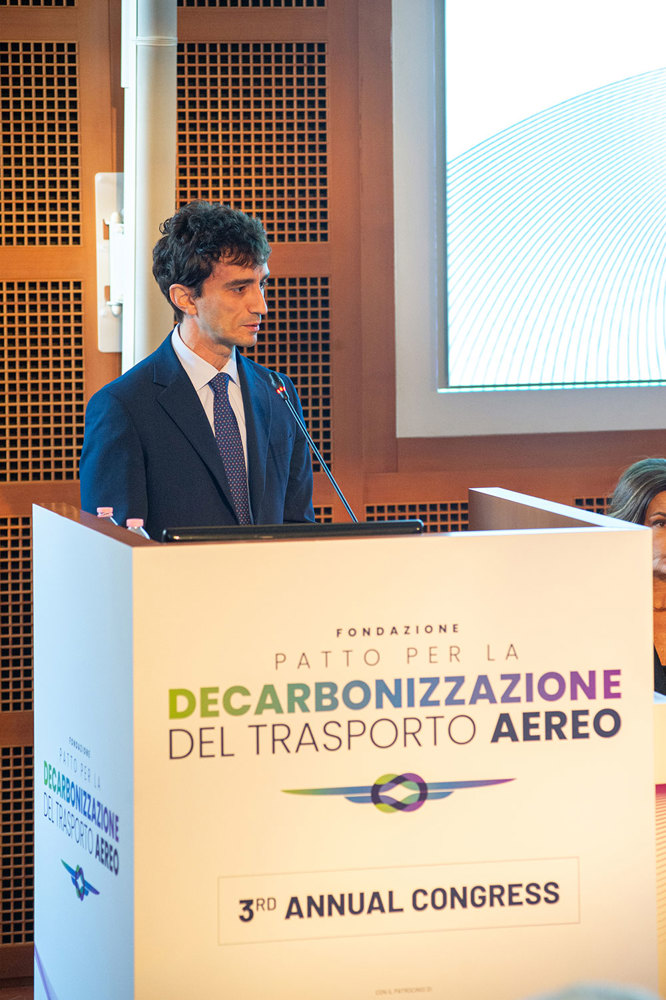30 November 2024
3rd Congress of the PACTA Foundation for the Decarbonization of Air Transport
SAF, technological innovation and intermodality: strategies for greener aviation and a Net Zero future by 2050
The aviation sector, which has always been perceived as one of the most difficult to decarbonize, is proving that a sustainable revolution is possible. This is the message that emerged strongly from the third annual Congress of the PACTA Foundation, held on November 28 in Rome. An event that brought together experts, companies, institutions and academics to discuss concrete solutions to reduce the environmental impact of air transport, without compromising the growth of the sector.
Air transport now accounts for 2-3% of global CO2 emissions, a significant share that requires targeted action. The PACTA Foundation, a unique alliance of 17 partners between companies, institutions and academics, has set itself the ambitious goal of making the sector fully sustainable by 2050. The meeting addressed issues such as the use of sustainable fuels, the technological evolution of aircraft and the development of intermodality between air and land transport.
At the center of the discussions was SAF, the sustainable aviation fuel. Produced from waste oils, animal fats and biomass, SAF can reduce emissions by up to 80% compared to traditional fuels. However, its high cost is a major barrier to spread.

Galeazzo Bignami Photo: Copyright © ADR Press Office
Marco Troncone, president of the PACTA Foundation and CEO of Aeroporti di Roma, underlined how SAF represents not only a resource, but a real strategic investment for the future of aviation. Troncone said: "Flying less is not the solution. Sustainability is not a constraint, but a key to a future in which environment and progress coexist."
The transition of air transport also passes through technological innovation. Electric, hydrogen and hybrid aircraft, under development, promise to revolutionise regional and medium-haul transport in the coming decades. The congress highlighted the need for substantial investment in research and development, involving both the public and private sectors.
Another crucial issue was that of intermodality. Upgrading rail infrastructure to connect airports and developing integrated tickets that combine air and land transport is one of the proposed solutions to further reduce emissions. Airports, for their part, are also called upon to transform themselves into sustainable hubs, optimizing air traffic and reducing emissions from operating fleets.
During the event, the Deputy Minister of Infrastructure and Transport, Galeazzo Bignami, reiterated that SAF represents the only viable alternative for air transport in the short term. "We are confident that, through common policies at European level, tools will be adopted to make SAF accessible and sustainable."
Pierluigi Di Palma, president of ENAC, instead underlined the importance of a pragmatic and non-ideological approach to sustainability, while Antonino Turicchi, president of ITA Airways, illustrated how the company has already embarked on the road to a greener future with one of the youngest fleets in Europe.
The PACTA Foundation has shown, once again, that the decarbonization of aviation is not only possible, but necessary. The event ended with a clear message: sustainability is not an obstacle, but an opportunity to rethink the sector and position Italy as a global leader in the ecological transition of air transport. An ambitious goal, but one that, with everyone's contribution, can become a reality.
PACTA Foundation
Promoted by ADR with the patronage of ENAC, the Ministry of the Environment and Energy Security (MASE) and the Ministry of Infrastructure and Transport (MIT) and to which companies and multinationals including ENI, ITA Airways, Bologna Airport, Airbus, Aviapartner, Enel, SAVE Group, Mundys, Swissport, Aeroporti 2030, Aviation Services, Boeing, Italo, Marsh, Roland Berger and Snam adhere, It aims, thanks to the collection and dissemination of scientific knowledge on the subject of decarbonisation, to contribute independently and transparently to the public debate on environmental issues, encouraging dialogue between institutions, public and private bodies, companies and associations active in the air transport and sustainability sector.
Rome Airports
Aeroporti di Roma, a Mundys Group company, manages and develops the airports of Rome Fiumicino and Ciampino and carries out other activities related and complementary to airport management. Fiumicino, the first and only airport in Italy with a Skytrax rating of 5 stars for excellent standards in quality of service, has two passenger terminals and is dedicated to business and leisure customers on domestic, international and intercontinental routes. Ciampino is mainly used by low-cost airlines, express-couriers and General Aviation activities.
Edited by the Editorial staff, Avion Tourism Magazine
Text source and photos: Copyright © ADR Press Office
Photo Rome: Copyright © Sisterscom.com / Shutterstock
You might be interested in
Sustainability

Sustainable Mobility
Volotea with TotalEnergies for sustainable fuel
An agreement for the supply of sustainable aviation fuel (SAF) for use on flights departing from French airports
Sustainability

Sustainable Mobility
Delta Air Lines accelerates to a sustainable future
With the goal of zero emissions by 2050, the company invests in efficient aircraft, optimizes flight operations and promotes the use of sustainable fuels
Sustainability

Sustainable Mobility
Emirates accelerates on the green transition
From 2026, the airline, in partnership with Moro Hub, will move its data center to the Mohammad Bin Rashid Al Maktoum Solar Park, the world's largest solar-powered data center




